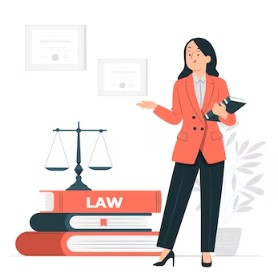The Importance of Having a Good Lawyer on Your Side by freegame24.xyz
Introduction to Legal Assistance
Dealing with legal issues can be a challenging and overwhelming experience, especially for those who are unfamiliar with the law. Whether you find yourself in a dispute, need assistance with a contract, or are facing more serious legal challenges, the role of a lawyer is invaluable. Lawyers offer a deep understanding of legal principles and can provide the expert advice needed to navigate these complex situations. They are equipped to analyze the specifics of your case and formulate strategies to address your unique concerns.

The legal landscape is filled with technical language and intricate rules that can be difficult to understand. This is where lawyers come in—they have the education and experience to break down complicated legal jargon and explain your options in clear, understandable terms. Their role is not just to represent you in court but also to advise you on the best course of action, whether that involves negotiation, mediation, or litigation.
Moreover, lawyers are skilled in various areas of law, allowing them to provide specialized knowledge depending on your needs. Whether you need assistance in family law, business law, criminal defense, or personal injury, there is a lawyer who specializes in that field and can offer you the most relevant advice. This specialization ensures that you receive guidance that is tailored to your particular situation.
Another critical aspect of legal assistance is the strategic advantage a lawyer can offer. They can foresee potential issues that may arise and develop contingency plans to address them. This proactive approach can save time, reduce costs, and improve the chances of a positive outcome. Lawyers also have access to a wealth of resources, including legal research databases, expert witnesses, and other professionals who can support your case.
In essence, having a lawyer means that you are not alone in dealing with your legal challenges. They provide the support and expertise needed to tackle complex legal issues, giving you a better chance of achieving a favorable result. Whether through litigation or other means, a lawyer’s role is to ensure that your interests are fully represented and protected throughout the legal process.
Navigating the Legal System
The legal system can be daunting and confusing for those unfamiliar with its processes. Laws and regulations are often written in complex language, making them difficult to comprehend without specialized training. This is where a lawyer’s expertise becomes invaluable. They are well-versed in legal terminology and procedures, allowing them to interpret the law effectively and provide clear explanations to their clients. A lawyer can help you navigate through legal processes efficiently, ensuring that you meet all deadlines and follow the correct protocols.
Beyond merely understanding the language of the law, lawyers possess a deep knowledge of procedural rules and the specific requirements needed to move a case forward. For example, the paperwork required in legal proceedings is not only extensive but must also be completed with precision. Any error, however minor, could result in delays or even unfavorable outcomes. A lawyer’s attention to detail ensures that all documents are accurately prepared and submitted on time, preventing such pitfalls.
Furthermore, legal proceedings often require strict adherence to timelines. Missing a filing deadline or court date can jeopardize your case. Lawyers track these crucial deadlines, making sure that each step in the legal process is executed promptly. This meticulous oversight can be the difference between a case that proceeds smoothly and one that encounters unnecessary complications.
In addition to handling procedural complexities, lawyers also play a critical role in formulating and executing legal strategies. They understand the nuances of different types of cases and can anticipate potential challenges before they arise. This proactive approach allows them to adapt strategies as needed, ensuring that your case remains on the right track.
Another advantage of having legal representation is their ability to negotiate effectively on your behalf. Whether it’s negotiating a settlement or arguing a motion in court, lawyers bring a level of professionalism and skill that can significantly impact the outcome. Their ability to present arguments logically and persuasively can make a considerable difference in various legal contexts, from negotiations to courtroom settings.
Overall, navigating the legal system requires a blend of specialized knowledge, precise execution, and strategic planning, all of which a qualified lawyer is equipped to provide.
Safeguarding Your Rights
One of the fundamental responsibilities of a lawyer is to ensure that your legal rights are protected at all times. From the moment you engage their services, a lawyer’s duty is to advocate on your behalf, providing you with a robust defense and ensuring that all your entitlements under the law are upheld. This becomes particularly crucial in interactions with law enforcement, opposing parties, or in a courtroom setting.
When dealing with law enforcement, it is easy to feel intimidated or unsure of your rights. A lawyer can guide you through these interactions, advising you on how to respond and ensuring that your rights are not infringed upon. They can help you understand what you are legally obligated to disclose and when you have the right to remain silent, which can be critical in protecting yourself from self-incrimination or unlawful searches and seizures.
In negotiations with opposing parties, a lawyer’s role is to ensure that your interests are represented fairly and effectively. Whether you are negotiating a settlement, a contract, or any other legal agreement, a lawyer will strive to achieve the best possible outcome for you. They have the expertise to identify any terms that may be unfavorable or harmful, and they can negotiate better terms on your behalf. Their involvement can significantly influence the fairness and balance of any agreements reached.
In court, a lawyer acts as your advocate, presenting your case with the necessary legal arguments and evidence to support your position. They understand the intricacies of courtroom procedures and can navigate them with skill, making sure that your case is heard and considered fairly. Their ability to cross-examine witnesses, present evidence, and argue motions is invaluable in ensuring that your rights are not only recognized but also actively defended.
Beyond the courtroom, lawyers also provide guidance on how to comply with various legal requirements, reducing the risk of unintentional violations that could jeopardize your rights. They stay informed about changes in laws and regulations, ensuring that their advice remains current and effective. This ongoing support helps you stay within the boundaries of the law while asserting your legal entitlements.
In essence, a lawyer serves as a vigilant protector of your rights, ensuring that you are treated justly throughout the legal process.
Developing Legal Tactics and Guidance
Legal cases demand a nuanced approach, and a skilled lawyer is adept at formulating strategies tailored to the unique aspects of your situation. From the moment you present your case, a lawyer will dive deep into the specifics, gathering all pertinent information to construct a well-rounded plan. Their goal is to identify the strengths and weaknesses of your case and use this knowledge to your advantage.

One of the first steps a lawyer will take is to conduct a thorough investigation. This involves collecting evidence, interviewing witnesses, and reviewing any relevant documents. By assembling a comprehensive picture of the case, a lawyer can pinpoint the best course of action. They can also anticipate potential challenges and devise plans to address them, ensuring that you are well-prepared for any hurdles that may arise.
In addition to building a strong factual foundation, a lawyer will also delve into the legal precedents and statutes that apply to your case. This deep dive into legal research enables them to craft arguments that are not only persuasive but also firmly grounded in the law. They will analyze past cases with similar circumstances to identify successful tactics and avoid pitfalls.
A critical aspect of developing legal tactics involves understanding the opposing party’s strategy. Lawyers use their experience to predict the moves of the other side, allowing them to counteract effectively. Whether it’s preparing for cross-examinations, negotiating settlements, or arguing motions in court, a lawyer’s strategic foresight can make a significant difference in the outcome of your case.
Communication is another key component of effective legal guidance. A lawyer will keep you informed at every step, explaining complex legal concepts in terms you can understand. This ongoing dialogue ensures that you are aware of all your options and the potential implications of each choice. By keeping you in the loop, a lawyer empowers you to make informed decisions that align with your best interests.
Overall, the development of legal tactics and guidance is a multifaceted process that requires meticulous attention to detail, strategic thinking, and a deep understanding of both the facts and the law. A skilled lawyer brings all these elements together, providing you with a robust strategy designed to achieve the best possible outcome.
Managing Legal Paperwork
Legal cases require extensive documentation, which can be overwhelming for individuals unfamiliar with legal procedures. Lawyers play a crucial role in managing this paperwork, ensuring every document is accurate and timely. From filing motions and drafting contracts to submitting evidence and formal statements, each piece of paperwork must adhere to strict legal standards.
A key aspect of a lawyer’s role is to understand the nuances of these requirements. Even a minor error or omission can lead to significant delays or unfavorable outcomes. Lawyers are meticulous in their approach, double-checking every detail to ensure compliance with legal standards. They also keep track of important deadlines, making sure that all documents are filed within the required time frames to avoid any procedural setbacks.
Lawyers are adept at drafting various types of legal documents, each tailored to the specific needs of your case. Whether it’s a contract, a legal brief, or a motion, they bring their expertise to bear in crafting documents that are not only legally sound but also strategically beneficial. Their knowledge of legal terminology and formal structures ensures that each document serves its intended purpose effectively.
In addition to drafting and filing, lawyers also handle the organization and storage of these documents. Legal cases can span months or even years, and maintaining an organized system for all paperwork is essential. Lawyers ensure that all documents are easily accessible and systematically filed, allowing for quick retrieval when needed. This organization is crucial for effective case management and for preparing responses to any unexpected developments.
Lawyers also facilitate communication between different parties involved in the case. Whether it’s sending documents to opposing counsel or submitting them to the court, they ensure that all communications are clear, professional, and timely. This not only helps in maintaining the flow of the case but also upholds your credibility in the eyes of the court.
Overall, lawyers’ expertise in managing legal paperwork helps to streamline the legal process, reducing the burden on you and increasing the likelihood of a favorable outcome.
Achieving Peace of Mind
Facing legal challenges can take a toll on your mental and emotional well-being. The complexities and uncertainties involved can lead to sleepless nights and constant worry. Having a lawyer on your side can significantly ease these burdens. With their expertise, you gain a trusted advisor who understands the intricacies of the legal system and can navigate it effectively on your behalf.
Knowing that a professional is handling your case allows you to focus on other important aspects of your life, whether it’s your family, career, or personal well-being. A lawyer’s involvement means that you don’t have to worry about missing critical deadlines or making procedural errors, as they will manage these details meticulously.
Additionally, a lawyer provides clear and consistent communication, keeping you informed about the progress of your case and explaining any legal terms or procedures in plain language. This transparency helps you feel more in control of the situation, as you are kept in the loop every step of the way.
The strategic guidance offered by a lawyer also contributes to your peace of mind. They can foresee potential challenges and plan accordingly, ensuring that you are well-prepared for any developments. This proactive approach reduces the element of surprise and allows you to anticipate outcomes more accurately.
Moreover, a lawyer acts as a buffer between you and opposing parties or law enforcement, handling all interactions and negotiations on your behalf. This not only ensures that your rights are protected but also spares you from the stress of direct confrontation.
Ultimately, having a lawyer means that you are not alone in navigating the often daunting legal landscape. Their support provides a sense of security and confidence, allowing you to approach your legal challenges with greater ease and assurance.



